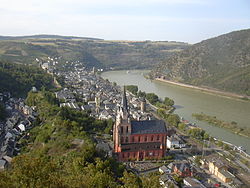Oberwesel
| Oberwesel | ||
|---|---|---|
 |
||
|
||
| Coordinates: 50°06′40″N 7°43′17″E / 50.11111°N 7.72139°ECoordinates: 50°06′40″N 7°43′17″E / 50.11111°N 7.72139°E | ||
| Country | Germany | |
| State | Rhineland-Palatinate | |
| District | Rhein-Hunsrück-Kreis | |
| Municipal assoc. | St. Goar-Oberwesel | |
| Government | ||
| • Mayor | Jürgen Port (CDU) | |
| Area | ||
| • Total | 18.11 km2 (6.99 sq mi) | |
| Elevation | 75 m (246 ft) | |
| Population (2015-12-31) | ||
| • Total | 2,834 | |
| • Density | 160/km2 (410/sq mi) | |
| Time zone | CET/CEST (UTC+1/+2) | |
| Postal codes | 55430 | |
| Dialling codes | 06744 | |
| Vehicle registration | SIM | |
| Website | www |
|
Oberwesel is a town on the Middle Rhine in the Rhein-Hunsrück-Kreis (district) in Rhineland-Palatinate, Germany. It belongs to the Verbandsgemeinde of Sankt Goar-Oberwesel, whose seat is in the town.
Oberwesel lies on the river Rhine’s left (west) bank in the Rhine Gorge, a UNESCO World Heritage Site, between the neighbouring towns of Sankt Goar and Bacharach.
The town is made up of several Stadtteile, namely the main centre, also called Oberwesel, and the outlying centres of Engehöll, Dellhofen and Langscheid.
Yearly precipitation in Oberwesel amounts to 604 mm, which is very low, falling into the lowest fourth of the precipitation chart for all Germany. Only at 22% of the German Weather Service’s weather stations are even lower figures recorded. The driest month is February. The most rainfall comes in June. In that month, precipitation is 1.6 times what it is in February. Precipitation varies only slightly. At only 1% of the weather stations are lower seasonal swings recorded.
As in many of the region’s towns, Oberwesel quite possibly had its beginnings as a Celtic settlement, named Vosavia or Volsolvia. The Romans later maintained a horse-changing station with a hostel here. After the fall of the limes, Oberwesel became a Frankish royal holding with a royal estate. The Wesel Estate passed under Emperor Otto I in 966 to the Archbishopric of Magdeburg. In 1220, Emperor Frederick II dissolved the pledge and Oberwesel became a free imperial city. In 1255, Oberwesel became a member of the Rhenish League of Towns (Rheinischer Städtebund), but in 1309, it lost its status as a free imperial city and fell under the lordship of the Electorate of Trier, to which it belonged until Secularization after the French Revolutionary Wars in 1802. In the so-called Weseler Krieg (“Wesel War”) in 1390 and 1391, the town tried yet again to turn over a new leaf, but after a successful siege by Archbishop of Trier Werner von Falkenstein, it had to back down.
...
Wikipedia



